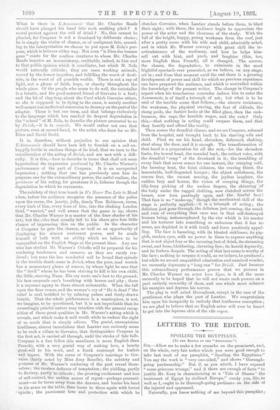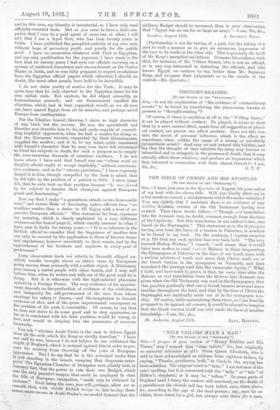LETTERS TO THE EDITOR.
SPOILING THE EGYPTIANS. •
[To THE EDITOR OF THE "SPECTATOR." I
Sin,—Allow me to make a few remarks on the prominent, and„ on the whole, very fair notice which you were good enough to take last week of my pamphlet, "Spoiling the Egyptians." You say the work is "very one-sided," and shows "thorough- going partisanship." But if, as you admit, I have exposed "some grievous wrongs," and if there are enough of facts "to justify Mr. Keay in characterising as a Tale of Shame' the treatment of Egypt by civilised Europe," surely you, Sir, as well as I, ought to be thorough-going partisans on the side of the injured and oppressed. Naturally, you know nothing of me beyond this pamphlet ; and in this case, my identity is immaterial, as I have only used officially-recorded facts. But as you seem to have a faint sus- picion that I may be a paid agent of some one or other, I will add that I am a loyal Scot, who has been twenty years in India. -I have published the pamphlet entirely at my own cost, 'without hope of pecuniary profit, and purely for the public good. I have no connection whatever with Turk or Egyptian, and my only qualification for the exposure I have made is the fact that for twenty years I had seen our officials carrying on a system of continual truculence and encroachment on the Native States in India, and so was fully prepared to expect revelations from the Egyptian official papers which otherwise I should, no doubt, like most other people, have held to be incredible.
I do not claim purity of motive for the Turk. It may be quite true that he only objected to the Egyptian loans for his own selfish ends. But anyhow, he did object ostensibly on humanitarian grounds ; and our Government repelled the objection, which, had it been supported, would, as we all now see, have spared Egypt from all its miseries, and perhaps saved Europe from conflagration.
For the IChedive Ismail, likewise, I claim no high character of any kind, but the reverse. He was the spendthrift and libertine you describe him to be, and quite capable of commit- ting frightful oppression, when he had a motive for doing so. But the European usurers, supported by their Governments, supplied the motive ; and it is, to my mind, quite consistent with Ismail's character that he may even have felt reluatano& -to bleed his subjects to death, for such a purpose as to supply -the ever-recurring demands of usurious creditors. I do not know where I have said that Ismail was one "whose word an English official ought to accept implicitly," without corrobora- tive evidence; and as for "sincere patriotism," I have expressly denied it to him, though compelled by the facts to admit that he did take up the position of a patriot in 1879. I show (page 43), that he only took up that position because "he was forced ,by las subjects to become their champion against European greed and domineering."
You say that I make "a gratuitous attack on two honourable men," and accuse them of dismissing native officials from "no worthier motive than a desire to fill Egypt with a host of ex- pensive European officials." This statement far from expresses my meaning, which is clearly _explained by a very -different sentence at the foot of page 27, which exactly answers to what I have seen in India for twenty years :—" It is so inherent in the British official to consider that the happiness of another race Can only be secured by the application to them of his own forms and regulations, however unsuitable to their wants, and by the appointment of his brothers and nephews to every'-post of preferment."
Long observation leads me utterly to discredit alleged un- selfish results brought about on native races by Europeans going among them primarily with a selfish object. A Missionary goes among a native people with clean hands, and I may well believe him, when he writes and tells me of the good work he is doing. But it is otherwise with the high-salaried placeman upheld by a Foreign Power. The very existence of his appoint- ment depends on the production of evidence of the wickedness and incapacity for self-government of the race from whose earnings his salary is drawn,—and the temptation to furnish evidence of this, and of the great improvement consequent on the creation of his post, is irresistible. Of course, to say that he does not strive to do some good and to stop oppression, as far as is consistent with his false position, would I:1e wrong in fact, and would be denying him the possession of common humanity.
You ask "whether Arabi Pasha is the man to deliver Egypt from all the evils which Mr. Keay so vividly describes." I have not said he was, because I do not believe he can withstand the Ini ght a England, which is arrayed against him in order to pre- vent his country from throwing off the yoke of European oPPression. But I do say that he is the principal leader that ie not standi prise' ng in the breach, essaying that desperate enter- Th— Chamber of . e Egyp uhamber of Delegates were plainly told, in unary last, that the power to vote their own Budget, which was the only peaceful weapon that could be employed to stem the tide a European usurpation, "could only be Obtained by violence!' Such being the case, you will, perhaps, allow me to remark that, with tr0,000 British trcops to face to-day, there seems mere reason in Arabi Pasha's successful demand that the military Budget should be increased, than in your observation that "Egypt has no use for so large an army."—I am, Sir, &a., [Partisanship is not the taking of a part, but the taking of a part in such a manner as to give an erroneous impression of the case to be made on the other side. This is precisely the fault of Mr. Keay's pamphlet and letters. Compare his evidence with that, for instance, of Mr. Villiers Stuart, who is not an official, or in any way interested in defending the officials, and who knows Egypt, we venture to say, better than Mr. Seymour Keay, and compare their judgments as to the results of the control.—En. Spectator.]































 Previous page
Previous page